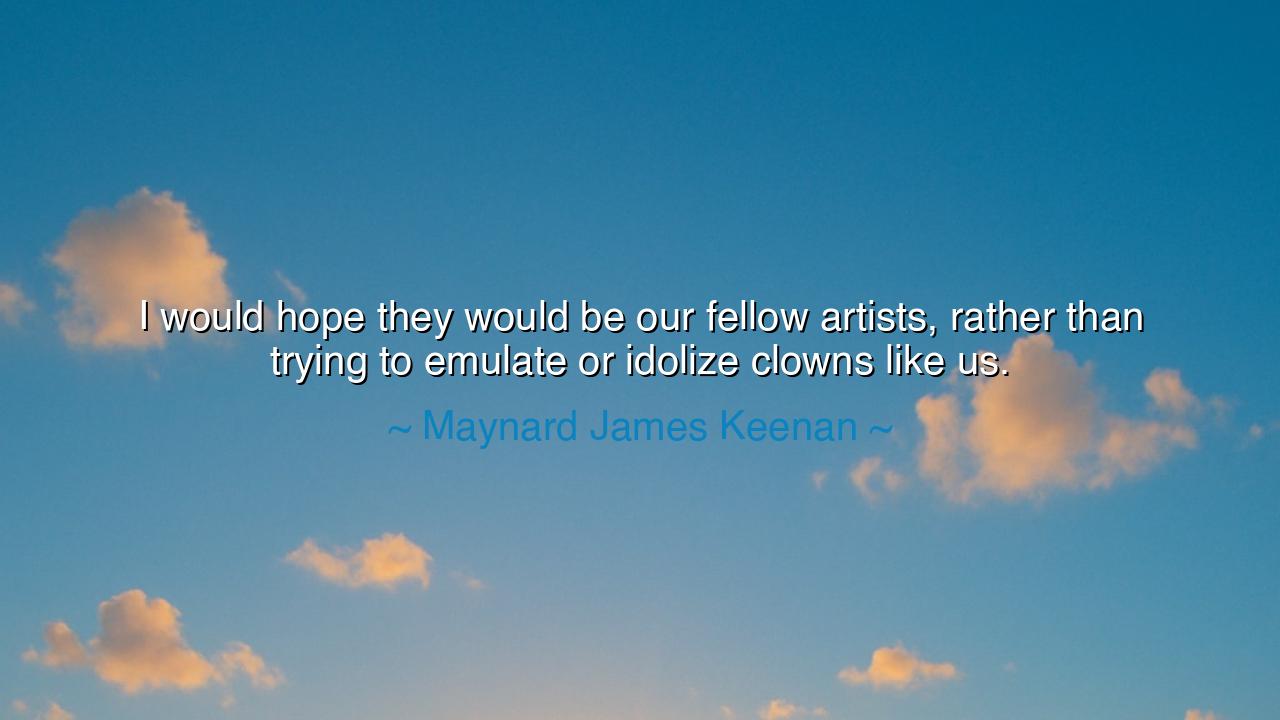
I would hope they would be our fellow artists, rather than trying
I would hope they would be our fellow artists, rather than trying to emulate or idolize clowns like us.






“I would hope they would be our fellow artists, rather than trying to emulate or idolize clowns like us.” — thus spoke Maynard James Keenan, the enigmatic voice of Tool, A Perfect Circle, and Puscifer — a man who cloaks truth in metaphor and wraps wisdom in irony. In this statement, Keenan unveils a truth as ancient as art itself: that the artist should awaken creators, not worshipers. His words cut through the noise of celebrity and the illusion of fame, reminding us that to idolize is to surrender one’s own power, and to create is to reclaim it.
The origin of this quote arises from Keenan’s disdain for the modern cult of personality — the obsession with artists as idols rather than as mirrors of human potential. He speaks as one weary of being placed upon a pedestal, knowing that such height often distorts more than it reveals. To him, the artist’s task is not to gather followers, but to inspire equals. “Fellow artists,” he calls them — companions in creation, not supplicants before the altar of fame. In his humility, he mocks himself as a “clown,” one who performs and provokes, but who should never be mistaken for a prophet. He reminds us that art, like truth, is meant to awaken freedom, not devotion.
The ancients knew this well. When the Greek philosophers taught, they sought not disciples who would worship them, but students who would surpass them. Socrates declared that wisdom lies in knowing that one knows nothing — and in doing so, he encouraged others not to imitate him, but to think for themselves. Likewise, the true artist, in Keenan’s vision, is one who ignites others to create, who teaches through example that expression belongs to all, not to a chosen few. To idolize the artist is to betray the art; to emulate blindly is to silence one’s own voice.
Keenan’s words also speak to a deeper warning — that idolatry corrupts authenticity. When people worship artists as gods, they cease to listen to the message and instead obsess over the messenger. This distortion breeds imitation without understanding, repetition without renewal. It is how music becomes hollow, how ideas lose their fire, and how the creative spirit — which should be boundless — becomes chained to the image of another. Keenan, ever the provocateur, calls himself a “clown” to strip away this illusion, to remind us that beneath the performance, he too is human — flawed, searching, and learning like the rest.
Consider the story of Bob Dylan, who, in the 1960s, was hailed as a prophet by his generation. Crowds followed him not only for his songs but for his supposed wisdom. Yet Dylan, sensing the danger of such reverence, turned away from it. He changed his sound, defied expectations, and confounded those who tried to define him. In doing so, he protected his soul — and forced his audience to grow. He refused to be their idol, choosing instead to be their mirror. Like Keenan, he understood that the role of the artist is not to be adored, but to challenge others to awaken their own creative fire.
The essence of Keenan’s message, then, is a call to authentic creation. To those who listen to his music, or to any artist’s work, he offers this challenge: Do not imitate the form — embody the spirit. Create something new. Let inspiration be a bridge, not a cage. For the world does not need more shadows of great men; it needs light from every soul that dares to speak its truth. The artist who truly honors his heroes does not echo their voices — he answers them, continuing the eternal dialogue of creation.
And so, my child, let this be the lesson: Do not worship those who create — create with them. Do not kneel before talent — nurture your own. The true tribute to any artist is not adoration, but transformation. Every masterpiece you admire is a torch passed to you; it is not meant to be gazed upon forever, but to ignite your own flame. The artist’s purpose is to awaken that courage within you — to remind you that the divine power of creation is not theirs alone, but yours also.
For as Maynard James Keenan reminds us, even the greatest artists are only clowns, reflections of the universal joke that we are all temporary players on this vast stage. But within that jest lies the sacred: each of us can create, express, and transform. Let us, then, honor the artist not through worship, but through participation. Let us join the dance, paint our own truth upon the canvas of existence, and become — as Keenan hoped — fellow artists, not idolaters, in the grand and unending work of creation.






AAdministratorAdministrator
Welcome, honored guests. Please leave a comment, we will respond soon